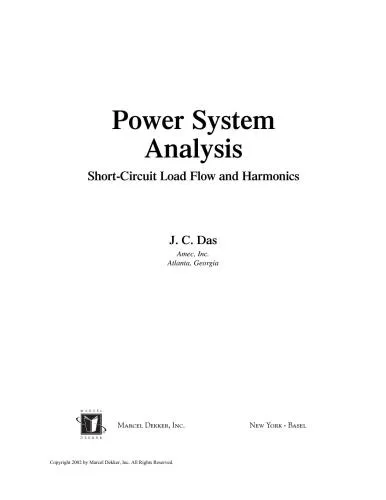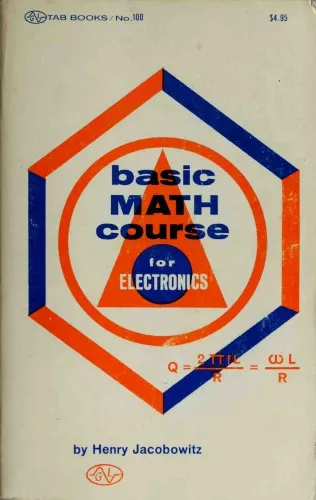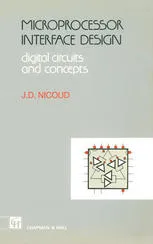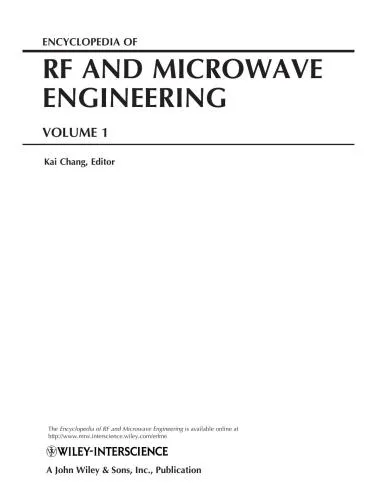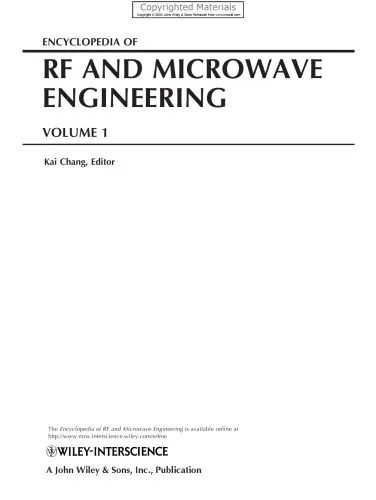Power System Analysis: Short-Circuit Load Flow and Harmonics (Power Engineering (Willis))
4.5
بر اساس نظر کاربران

شما میتونید سوالاتتون در باره کتاب رو از هوش مصنوعیش بعد از ورود بپرسید
هر دانلود یا پرسش از هوش مصنوعی 2 امتیاز لازم دارد، برای بدست آوردن امتیاز رایگان، به صفحه ی راهنمای امتیازات سر بزنید و یک سری کار ارزشمند انجام بدینکتاب های مرتبط:
خلاصه کامل کتاب
کتاب Power System Analysis: Short-Circuit Load Flow and Harmonics نوشتهی J.C. Das یکی از منابع برجسته در حوزه مهندسی قدرت است. این کتاب به تحلیل جامع سیستمهای قدرت، با تمرکز بر موضوعات کلیدی مانند Short-Circuit، Load Flow، و Harmonics، میپردازد. مخاطبان این کتاب عمدتاً مهندسان برق، محققان، و دانشجویان رشته مهندسی قدرت هستند که به دنبال درک عمیقتر مفاهیمی مانند عیبهایی با جریان کوتاه، رفتار دینامیکی جریانها، و تأثیرات هارمونیکها در سیستمهای الکتریکی میباشند.
این کتاب نه تنها اصول تئوری را پوشش میدهد، بلکه با ارائه مثالهای عملی و کاربردی، به کاربران کمک میکند تا دانش نظری را در محیطهای واقعی اجرا و آزمایش کنند. در این کتاب، نویسنده تلاش میکند تا مشکلات پیچیده مهندسی قدرت، از جمله تجزیه و تحلیل هارمونیکها، هماهنگی حفاظت، و طراحی مؤثر سیستمها را به صورتی ساده و قابل فهم تشریح کند.
نکات کلیدی و دستاوردها
- توضیحات دقیق درباره اصول برق قدرت و کاربردهای عملی
- راهحلهای مدرن برای تجزیه و تحلیل Short-Circuit و Load Flow
- درک عمیق از Harmonics و تأثیر آن بر عملکرد تجهیزات الکتریکی
- پوشش روشهای پیشرفته مدلسازی و شبیهسازی در سیستمهای قدرت
- تأکید بر ایمنی و هماهنگی حفاظت در طراحی سیستمهای قدرت
جملات معروف از کتاب
"Understanding power systems requires not just technical expertise but a holistic view of how electricity interacts with components, systems, and the environment."
"Power system harmonics are not just disturbances; they can represent critical risks to system stability and operational efficiency."
"Short-circuit analysis isn't about avoiding failures; it's about understanding and designing resilience."
چرا این کتاب مهم است؟
کتاب Power System Analysis نه تنها یک منبع علمی و آموزشی است بلکه یک ابزار کاربردی برای مهندسان برق محسوب میشود. سیستمهای قدرت قلب زیرساختهای مدرن هستند و مشکلات مربوط به Short-Circuit، Load Flow، و Harmonics تأثیر مستقیم بر بهرهوری، پایداری، و ایمنی این سیستمها خواهند داشت. از این رو، داشتن دانش جامع درباره جوانب مختلف این موضوعات حیاتی است.
این کتاب اهمیت ویژهای در آموزش و توسعه مهارتهای حرفهای مهندسان دارد. با مطالعه این اثر، خوانندگان نه تنها دانش نظری کسب میکنند بلکه مهارتهای عملی لازم برای حل مشکلات پیچیده مهندسی قدرت را نیز فرا میگیرند. برای دانشجویان و کارشناسانی که به دنبال پیشرفت در زمینه مهندسی قدرت هستند، این کتاب یک منبع ضروری است.
Introduction to 'Power System Analysis: Short-Circuit Load Flow and Harmonics'
Written by J.C. Das, 'Power System Analysis: Short-Circuit Load Flow and Harmonics' is a comprehensive guide designed for engineers, researchers, and students who specialize in the field of power engineering. This book bridges the gap between theoretical concepts and practical applications, helping readers approach the complexities of power systems with clarity and confidence. Tailored to meet the growing demands of the modern power industry, the text excels in providing detailed coverage of short-circuit analysis, load-flow calculations, and harmonic analysis.
Detailed Summary of the Book
The book delves into critical aspects of power system engineering, focusing on the principles and mathematical models required to analyze and optimize modern electrical systems. Beginning with the fundamentals, the author introduces the concepts of symmetrical components, per-unit systems, and fault analysis, laying the foundation for short-circuit studies. These basic principles are illustrated through examples that make it easier for readers to conceptualize and apply the information in real-world scenarios.
The second major focus of the book involves load-flow analysis, a cornerstone of power system planning and operation. J.C. Das provides iterative methods to perform load-flow calculations, enabling readers to estimate voltage drops, power losses, generator performance, and more under various conditions. Designed for accuracy and efficiency, these methodologies are enriched by practical examples.
Lastly, the book offers in-depth insights into harmonics, a critical issue in today’s energy systems. It explains their origins, impacts on electrical networks, and techniques to mitigate them. Harmonic analysis is presented in a way that readers can grasp its significance without prior advanced knowledge, making the book accessible to both novices and seasoned professionals.
By the end of the book, readers will have acquired the expertise to design and analyze power systems, perform fault-level calculations, predict system behaviors under load conditions, and address harmonic distortions effectively.
Key Takeaways
- A detailed understanding of symmetrical components and fault analysis techniques.
- Proven iterative methods for load-flow calculations applicable to real-world designs.
- Comprehensive harmonic analysis methodologies for reducing distortions in the system.
- Practical examples and case studies to enhance problem-solving capabilities.
- Hands-on approaches for integrating theoretical concepts into system-level designs.
Famous Quotes from the Book
"Electrical systems are not static; they evolve in complexity and interdependence, requiring deeper insights and adaptable solutions."
"Harmonics are not merely a by-product of modern technology; they are challenges that demand innovative approaches rooted in solid engineering principles."
Why This Book Matters
As the field of power engineering continues to evolve with advancements in renewable energy integration, smart grids, and distributed systems, a strong foundation in traditional power system analysis remains indispensable. This book serves as a crucial resource for professionals and students striving to master these fundamentals while addressing modern challenges such as harmonic distortion and system optimization.
Power systems are the backbone of technological development, and the ability to analyze and fine-tune these systems is paramount for sustainability and efficiency. J.C. Das’s work stands out for its meticulous approach to balancing theoretical rigor with practical application, making it a valuable asset for engineers at any stage of their career.
Moreover, the book’s focus on harmonics offers unique insights into a pressing issue in the industry, enabling readers to proactively address potential disruptions and ensure the reliability of their systems.
Ultimately, 'Power System Analysis' empowers its audience to tackle the challenges of power system engineering and contribute to the advancement of this essential field in the modern era.
دانلود رایگان مستقیم
شما میتونید سوالاتتون در باره کتاب رو از هوش مصنوعیش بعد از ورود بپرسید
دسترسی به کتابها از طریق پلتفرمهای قانونی و کتابخانههای عمومی نه تنها از حقوق نویسندگان و ناشران حمایت میکند، بلکه به پایداری فرهنگ کتابخوانی نیز کمک میرساند. پیش از دانلود، لحظهای به بررسی این گزینهها فکر کنید.
این کتاب رو در پلتفرم های دیگه ببینید
WorldCat به شما کمک میکنه تا کتاب ها رو در کتابخانه های سراسر دنیا پیدا کنید
امتیازها، نظرات تخصصی و صحبت ها درباره کتاب را در Goodreads ببینید
کتابهای کمیاب یا دست دوم را در AbeBooks پیدا کنید و بخرید
